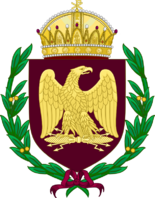Politics of Latium
| This article is part of a series on the |
| Politics of Latium |
|---|
 |
Latium is a semi-constitutional executive monarchy with a unicameral legislature. Its executive and head of state is the Monarch, currently held by co-monarchs Diana I Anicia and Jacobus VI Claudius, with Constantine XX Claudius as junior emperor. The legislature of Latium is the Senate, which is the single oldest government institution in the county. The Senate is officially headed by the Monarch, who serves as First Man of the Senate, though the highest ranked Senator is the Praeses Senatus, who unofficially acts as a co-head of government with the Master of Offices.
While political parties are banned, he Latin elective political system operates under a de-facto multi-party system, dominated by two major factions with minor factions having various levels of electoral success. Since the 1860s, the two largest political parties were been the Populares and Optimates. Coalition and minority governments have been a feature of senatorial politics periodically over the last century due to the first-past-the-post used for general elections tends to maintain the dominance of these two parties, however there have been attempts to adopt more proportional voting systems. The current senate majority is composed of primarily Optimates senators, with Alexander Pompilius serving as Praeses Senatus since 2016.
The judiciary has been tied to both the executive and legislature since the ancient Alban Kingdom. Historically, the courts were made up of members of Curiate and People's Assemblies in the Republican senate, and later the early imperial senate, and the Sacred Assembly. Today the highest court in the land is the Trigintiviral Court.
Government
Latium operates with an uncodified constitution, in which the country's fundamental rules come from a variety of legal instruments, statutes, customs and imperial decree. Officially, the country is classified as a unitary parliamentary wikipedia:xecutive monarchy, meaning the Monarch holds and exercises executive power of the state.
Emperor
The Monarch is the dominant figure in Latin politics. He appoints the Praeses Senatus, which by convention is generally the leader of the largest political faction in the Senate. He or she appoints ambassadors, ministers, and secretaries, though often time consults with government. The Monarch is a non-partisan figure in Latin politics, even though most tend to publicly favor a particular faction or ideology, because it is the Imperial Office's duty to "act with the best benefit of the state in mind." As such, the emperor swears an oath of office to run the government, maintain the law, and make decisions in the interests of the People. The Emperor’s duty is to ruling for the benefit of the People, and while the role is hereditary by nature, for succession to be complete an emperor is acclaimed by the military and People.
Some of the Emperor's powers include: providing or denying Imperial assent to a senatorial bill, ruling by edict or imperial order, declare war and undertake military action, sign treaties and trade agreements, direct foreign policy, appoint judges, and the ability to directly introduce legislation, etc.
Imperial court
Imperial Court, formally the Court of Augustus (Aula Augusti), is the collective of agencies, individuals, and offices that serve as the government of Latium. It is the central government of the emperor and its supporting administration through a complex and extensive bureaucracy. Court also includes a wide array of imperial household officials and its own administrative officials to support the Emperor and Imperial Family. Chief among these court officers is the Master of Offices, who leads the bureaucracy and civil service, and is considered a co-head of government.
Legislative branch
The Senate is one of the oldest institutions of Latium, dating back to the 8th century BC as the Alban council of elders. The first recorded written records of the Senate are dated to the 6th century BC. The Monarch is the head of senate by virtue of being Princeps Senatus, literally "first man of the senate." However, following numerous reforms in both the 1860s and 1950s, the senate is the unicameral legislature of Latium. Every year the senate is opened by the emperor and the co-consuls.
The Praeses Senatus serves as a de facto co-head of government due to its role as an instrumental officer of the Collegium Primicerium; however, the college is lead and directed by the emperor, or Master of Offices in his absence. The Praeses Senatus serves as the Monarch's chief government minister, and presiding officer of the Senate. Historically, the Praeses Senatus was not responsible to the Senate, but solely to the Monarch. Since the 20th century, the Consul is typically the leader of the largest faction or group of factions in the Senate, causing the sitting consul to hold both the confidence of the Monarch and a majority of the Senate. Historically, when the emperor appoints a Praeses Senatus that is not the leader of a faction, a new faction may form around the Praeses Senatus.
Today the Senate consists of 794 senators, 673 of which are elected from a national faction list and represent the entire population of Latium under the theory of virtual representation. Senators are nominated by sanctioned political factions, while a small number of independent candidates may be appointed or elected if they are members of faction electoral alliance. The Senate holds authority over financial and budgetary matters. Legislation is enacted by the Princeps Senatus whereby the Senate and Praeses Senatus may pass legislation within the legislature, but also provides the Monarch an integral role in signing, aiding in drafting and negotiating, and in many instances proposing legislation. There are also mechanisms that allow members of the Senate to bring to the attention of the government particular issues affecting their constituents.
The Senate Building, often referred to as Curia Claudia or more irregularly, Palatium Forum, is located near the Forum in Castellum ab Alba.
Ministries
Praetors and secretaries of the College of Praetors are nominated and appointed by the Monarch. In practice, the Monarch traditionally nominates a candidate that reflects the will of the majority in the Senate, which allows the Consul some ability to advise the Monarch to consider certain individuals for certain ministries. Cabinet nominees must be a Latin citizen, but with few exceptions, largely hold seats in the Senate.
Judiciary
The judiciary in Latium flows from imperial power, whereby judicial magistrates are appointed by the emperor and serve at his pleasure, though in most instances are appointed for a flat term of years, whether 5 or 10 years. The court system consists of three types of courts: ordinary courts, which handle criminal and civil litigation; administrative courts which supervise the government and handle complaints; and extra ordinary courts, which handle matters relating to probate, patent or trademark, and the regulation of peerages, titles, and arms. Each court form may also be broken down into any number of courts, though all include courts of original jurisdiction, appellate courts and courts of last resort.
Local government
Dioceses
Dioceses are the top level of administration of local governments; there are eight total regions. Prior to 2011, dioceses each had an appointed regional council which held little in the way of effective power. At the passing of the Local Government Reform Act in 2011, all regional councils were abolished and effectively stripped of the limited powers they held. Today, Augustal prefectures are little more than a geographic measure utilized by the government when it comes to distributing things like healthcare funds.
Second Level Divisions
Second level administrative divisions in Latium are the first level of local government which receive functional governmental powers. These second level divisions consist of either counties or unitary authorities. These county divisions are largely based upon more ancient or medieval ceremonial counties which served as functional local governments prior to the Social War. All second-level divisions are governed by an elected county council of anywhere from 50 to 163 councilors and a Propraetor appointed by the Monarch.
Constitution
Elections and electoral groups
Elections
There are two types of elections in Latium: senatorial elections, elections to the provincial commissions and local council elections. Elections are held on election day, which is conventionally a Tuesday or Thursday. Senatorial elections do occur every five years, and by convention emperors have not called for early elections and instead fill senatorial vacancies by appointment. Generally, provincial and local elections take place every five years.
Elections are administered locally: in each lower-tier local authority, the actual polling procedure is run by the appointed Imperial Electoral Commission officer or Returning Officer, with the compiling and maintenance of the electoral roll by the Electoral Registration Officer. The Imperial Electoral Commission sets standards for and issues guidelines to Returning Officers and Electoral Registration Officers, but is responsible for nationwide electoral administration (such as assisting the Sacred Assembly in registering factions and faction lists).
Political factions
Political parties and groups are officially prohibited in Latium and may not stand candidates for election to government offices. Standing senate order also bans its members from holding affiliation in political parties. Instead, the Sacred Assembly, which is the body responsible for supervising elections, sanctions electoral factions for senate elections and elections to devolved assemblies. Local elections, while there is some informal affiliation to larger factions, are strictly non-partisan. The oldest electoral factions in Latium are the senatorial Populares and Optimates. Historically, Medietas was a historically prominent third faction, but ceased to exist after its membership joined the Populares in the early 1950s. Since the 1950s, the majority of Consuls have affiliated with the Populares.
Electoral factions in local assemblies operate similarly to senatorial factions. There is some informal affiliation between devolved factions and a senatorial counterpart; however, any official affiliation is prohibited by imperial law.


